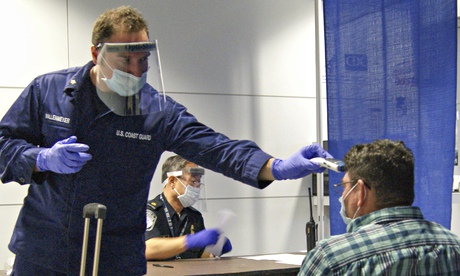Lancet study says that exit screening from Ebola-hit countries most efficient; only 8.7% of travellers from the region go to UK

Less than three people a month infected with the Ebola virus are likely to try to board planes out of west Africa, according to a study that says exit screening would be the most efficient way to try to prevent travellers spreading disease.
The UK and US have set up entry screening at airports for passengers arriving from west Africa, but the paper in the Lancet medical journal says this will have little chance of detecting somebody infected with the virus and that it will cost money that could be better spent.
The paper is written by Dr Kamran Khan at St Michael’s Hospital in Toronto, Canada, and colleagues. The team analysed worldwide flight schedules from 2014, taking account of the routes that have been suspended because of the crisis, and flight itineraries from 2013 to establish the population’s normal travel patterns. They used World Health Organisation data on Ebola virus infections.
The authors say that restricting air travel from Guinea, Sierra Leone and Liberia, where the epidemic is raging, is damaging to the countries’ economies and may potentially handicap efforts to end the Ebola outbreak, which is the best way to safeguard the rest of the world.
They found that most travellers from the three countries – more than 60% – fly to low- and middle-income countries, with Ghana and Senegal as the top destinations. The arrival of somebody infected with Ebola is a greater threat to less affluent countries than to the UK, which was the third most popular destination, with 8.7% of travellers, or to the USA, where 2% would be headed.
“Given that these countries have limited medical and public health resources, they may have difficulty quickly identifying and effectively responding to imported Ebola cases,” said Khan.
“The risk of international spread could increase significantly if the outbreak in west Africa persists and grows. Risks to the global community would further increase if Ebola virus were to spread to and within other countries with weak public health systems.”
Screening passengers either at exit or entry will miss cases, the paper says, because of the long incubation period of the virus – up to 21 days. Because many direct flights to countries like the UK have been stopped, travellers anyway have to change planes or use additional forms of transport and may not be identified as coming from west Africa.
Exit screening in the capital cities of Conakry, Freetown and Monrovia “would offer greater efficiency, and might be simpler to operationalise, than entry screening all flights arriving directly from affected countries,” says the paper. But it needs support from the international community, because the west African states are in the middle of an emergency.
A lot of attention has been focused on ways in which affluent countries can protect their populations, Khan told the Guardian, including travel bans. But, he said, “the most proactive way is to decrease the many new infections in the source region itself”.
While a ban might make people far from west Africa feel more secure, he said: “Our analysis suggests the opposite. Decreasing the number of infections in the source area is the most important way to decrease the spread.”
Other experts commented, however, that political considerations will often trump scientific analysis.
“What this research fails to consider,” said Dr Adam Kamradt-Scott, senior lecturer in international security studies, at the University of Sydney, “is that in public health crises like Ebola the political pressure on leaders to be seen to be doing everything they can to protect their citizens is immense. We can have the best available evidence, but it won’t amount to a hill of beans if we don’t also understand the politics behind these events.”
